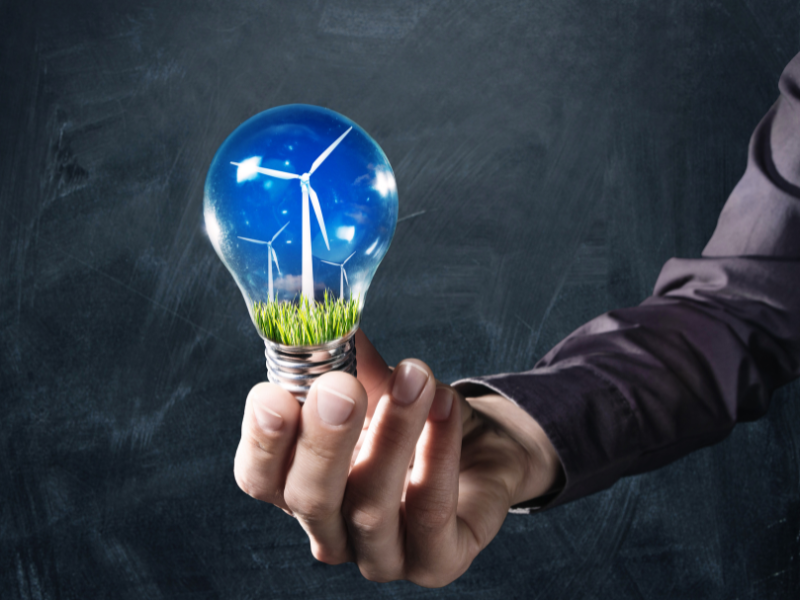Sustainable energy plays a critical role in addressing the challenges of climate change, environmental degradation, and energy security. It refers to the generation and utilization of energy from renewable sources that have minimal impact on the planet and ensure long-term sustainability. Beyond the environmental aspect, sustainable energy also brings forth numerous social benefits that positively impact society as a whole.
In this article, we will explore the various social benefits of sustainable energy and how they contribute to a brighter and more sustainable future for humanity.
The Importance of Sustainable Energy

Sustainable energy is of paramount importance as it offers a viable solution to combat the negative implications of conventional energy sources. With the world’s population continuously growing, it becomes imperative to find alternative energy sources that are not only environmentally friendly but also socially and economically sustainable. By transitioning to sustainable energy sources, we can create a more resilient and inclusive society that prioritizes the well-being of both present and future generations.
Benefits of Sustainable Energy for Society

Social benefits of sustainable energy encompass a broad range of advantages that promote human well-being, equity, and progress. Let us explore some of the key social benefits in detail:
Reduced Greenhouse Gas Emissions
Sustainable energy sources such as solar, wind, and hydroelectric power produce significantly fewer greenhouse gas emissions compared to fossil fuels. This reduction in emissions helps mitigate climate change by curbing the levels of carbon dioxide and other pollutants in the atmosphere. By transitioning to sustainable energy, we can contribute to a healthier planet and reduce the risk of catastrophic climate events.
Improved Air Quality
Conventional energy sources like coal and oil burning often lead to the release of harmful pollutants into the air, negatively impacting air quality and human health. Sustainable energy sources, on the other hand, do not produce such pollutants, thereby leading to improved air quality. Cleaner air translates to a healthier population, reduced instances of respiratory diseases, and an overall improvement in the quality of life.
Enhanced Public Health
The improved air quality resulting from the use of sustainable energy has a direct positive impact on public health. According to the World Health Organization, air pollution accounts for millions of premature deaths worldwide. By transitioning to sustainable energy, we can significantly reduce the health risks associated with air pollution, leading to healthier and more productive communities.
Job Creation and Economic Growth
The adoption of sustainable energy technologies and infrastructure leads to the creation of new job opportunities and drives economic growth. Renewable energy industries require skilled professionals, technicians, engineers, and researchers, leading to job creation across various sectors. Moreover, the development and expansion of sustainable energy projects stimulate local economies and attract investments, fostering overall economic development.
Energy Independence
Dependence on imported fossil fuels can leave nations vulnerable to price fluctuations, supply disruptions, and geopolitical tensions. Sustainable energy sources provide a pathway towards energy independence by harnessing the power of domestic resources such as sunlight, wind, and water. By diversifying the energy portfolio, countries can reduce their reliance on foreign energy sources and enhance their energy security.
Increased Energy Access
Sustainable energy offers the opportunity to provide reliable and affordable electricity to remote and underserved communities. In many developing regions, traditional energy infrastructures are absent or unreliable, leaving millions without access to electricity. By implementing sustainable energy solutions like decentralized solar panels and mini-grids, these communities can overcome energy poverty and improve their standard of living.
Sustainable Development
Sustainable energy is inseparable from the concept of sustainable development. It provides a means to meet the energy needs of the present without compromising the ability of future generations to meet their own needs. By integrating sustainable energy practices into development initiatives, we can create resilient, equitable, and environmentally conscious communities that thrive in a changing world.
Social Equity and Justice
The social benefits of sustainable energy extend to promoting social equity and justice. Access to affordable and clean energy ensures that no one is left behind and creates a level playing field for economic and educational opportunities. Sustainable energy solutions empower marginalized communities and address energy inequalities, fostering a more inclusive and just society.
Climate Change Mitigation
Climate change is one of the greatest challenges facing humanity. Sustainable energy plays a vital role in mitigating climate change by reducing greenhouse gas emissions and promoting the use of carbon-neutral energy sources. By transitioning to sustainable energy, we can collectively work towards limiting global warming and safeguarding the planet for future generations.
Reduced Water Pollution
Unlike traditional energy production methods that often involve the extraction and burning of fossil fuels, sustainable energy sources have minimal water pollution implications. Fossil fuel extraction and transportation can lead to water contamination through spills and leaks. Sustainable energy technologies, such as solar and wind power, greatly reduce the risks of water pollution and help protect precious water resources.
Preservation of Natural Resources
Conventional energy sources like coal and natural gas deplete non-renewable natural resources, contributing to environmental degradation. Sustainable energy, on the other hand, relies on renewable sources such as sunlight, wind, and water, which are virtually inexhaustible. By shifting to sustainable energy, we can preserve natural resources for future generations and reduce the burden on the environment.
Resilience and Disaster Preparedness
Sustainable energy infrastructure enhances the resilience of communities in the face of natural disasters and other emergencies. Microgrids and localized renewable energy systems can provide reliable power even in the event of grid failures or infrastructure damage. By integrating sustainable energy into disaster preparedness strategies, communities can become more resilient, self-sufficient, and better equipped to address climate-related challenges.
Community Empowerment
Sustainable energy projects often involve community participation and ownership, empowering local residents to actively contribute to their energy needs and decision-making processes. Community-owned renewable energy initiatives foster a sense of empowerment, collective action, and shared benefits. These projects can stimulate local economies, improve social cohesion, and bring communities closer together.
Education and Awareness
The transition to sustainable energy provides ample opportunities for education and awareness-building. Schools, universities, and training institutes can develop programs to educate students and professionals about renewable energy technologies, energy efficiency, and sustainable practices. By equipping individuals with knowledge and skills, we can create a more informed society that actively participates in the sustainable energy transition.
Technology and Innovation
The pursuit of sustainable energy encourages technological advancements and innovation. Researchers and engineers continually strive to develop more efficient and cost-effective renewable energy technologies. This spirit of innovation extends beyond energy production and covers various sectors, including energy storage, transportation, and smart grid systems. Sustainable energy drives technological progress and fosters a culture of innovation.
Collaboration and Cooperation
The shift towards sustainable energy requires collaboration and cooperation among governments, businesses, communities, and individuals. By working together, we can overcome technical, financial, and regulatory barriers associated with sustainable energy deployment. Global cooperation is essential to share best practices, transfer technology, and collectively address the challenges associated with climate change and energy transition.
International Relations
Sustainable energy has the potential to strengthen international relations by fostering cooperation and shared goals. Countries can establish partnerships and collaborate on scientific research, technological development, and policy implementation. The pursuit of sustainable energy paves the way for diplomatic ties and economic collaboration, promoting peace and stability on a global scale.
Cultural Preservation
Many traditional societies rely on natural resources and have deep cultural connections to their environment. Sustainable energy projects can be designed to respect and preserve cultural heritage while providing clean and reliable energy access. By integrating cultural considerations into sustainable energy initiatives, we can ensure the preservation of diverse cultures and traditions for future generations.
Energy Security
Energy security is a critical aspect of national and regional stability. By diversifying the energy mix and relying on domestic renewable resources, countries can enhance their energy security and reduce their vulnerability to geopolitical risks. Sustainable energy contributes to a more resilient and secure energy infrastructure, reducing dependence on volatile fossil fuel markets.
Affordable and Accessible Energy
Sustainable energy aims to provide affordable and accessible energy to all, regardless of economic status or geographical location. By leveraging renewable energy sources, communities can reduce their reliance on expensive and imported fossil fuels, leading to greater affordability and energy equity. Accessible energy is a fundamental human right, and embracing sustainable energy is a step towards achieving this goal.
Positive Environmental Impact
Choosing sustainable energy over conventional energy sources ensures a positive environmental impact. Renewable energy technologies produce minimal to no air pollution, reduce water usage, and have a smaller ecological footprint. By promoting sustainable energy, we can safeguard wildlife habitats, protect biodiversity, and restore ecosystems that have been impacted by climate change and unsustainable practices.
Healthier and Safer Environments
Sustainable energy contributes to the creation of healthier and safer environments for communities worldwide. With reduced air pollution and improved air quality, the incidence of respiratory diseases and other health issues decreases. Furthermore, sustainable energy projects often prioritize safety measures and adhere to strict environmental regulations, minimizing the risks associated with conventional energy production.
Long-term Cost Savings
Investing in sustainable energy can lead to long-term cost savings for individuals, businesses, and governments. While initial investments may be higher, the operational and maintenance costs of renewable energy systems are often lower compared to traditional energy sources. As technology advances and economies of scale are achieved, the cost of renewable energy continues to decline, making it a financially viable option in the long run.
Quality of Life Improvement
The social benefits of sustainable energy directly translate into an improved quality of life for individuals and communities. Access to clean and reliable energy enhances living standards, facilitates economic opportunities, and improves overall well-being. Sustainable energy promotes a harmonious relationship between humans and the environment, resulting in a higher quality of life for both present and future generations.
Sustainable Communities
Ultimately, sustainable energy promotes the development of sustainable communities. By integrating renewable energy, energy efficiency measures, and sustainable practices into urban planning and infrastructure development, communities can thrive in a manner that is environmentally responsible, socially inclusive, and economically prosperous. The adoption of sustainable energy acts as a catalyst for creating resilient, livable, and future-proof communities.
FAQs

Is sustainable energy expensive?
Contrary to popular belief, sustainable energy is becoming increasingly cost-competitive with traditional energy sources. The initial investment may be higher, but the long-term operational and maintenance costs are often lower. Moreover, advancements in technology and economies of scale contribute to a continual decrease in renewable energy costs.
Can sustainable energy provide reliable electricity?
Yes, sustainable energy can provide reliable electricity. The intermittent nature of certain renewable energy sources like solar and wind power can be effectively addressed through energy storage technologies and grid integration solutions. By combining different sources of sustainable energy and implementing smart grid systems, reliable and uninterrupted electricity supply can be achieved.
How does sustainable energy contribute to job creation?
Sustainable energy industries, such as solar, wind, and hydropower, require skilled professionals, technicians, engineers, and researchers. The growing demand for renewable energy technologies and infrastructure drives job creation across various sectors. Additionally, the installation, maintenance, and operation of sustainable energy systems generate employment opportunities at the local level.
Can sustainable energy address energy poverty?
Yes, sustainable energy has the potential to address energy poverty by providing reliable and affordable electricity to underserved communities. Decentralized renewable energy solutions like solar panels and mini-grids can overcome the limitations of traditional energy infrastructures in remote areas. Sustainable energy brings electricity access to those who have historically been left behind, improving their standard of living and economic opportunities.
Conclusion

The social benefits of sustainable energy are vast and wide-ranging, encompassing aspects of human well-being, equity, and progress. From reducing greenhouse gas emissions and improving air quality to creating job opportunities and enhancing public health, sustainable energy offers a holistic approach to addressing the challenges we face in the modern world. By embracing sustainable energy, we can build a brighter, more equitable, and resilient future for all. Let us collectively work towards a sustainable energy transition that prioritizes the social, economic, and environmental needs of both present and future generations.

